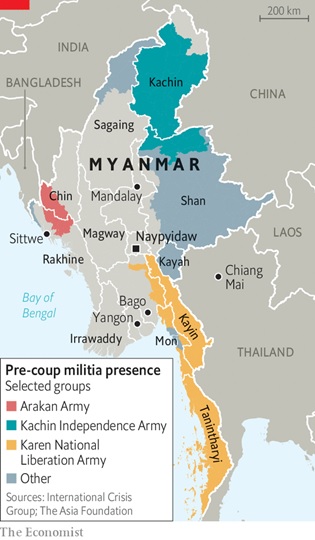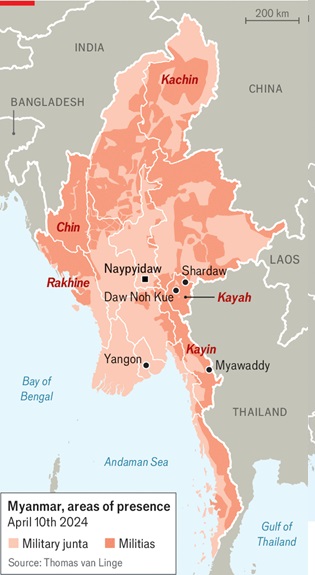SHOULD INDIA REVIEW ITS MYANMAR POLICY IN VIEW OF THE HUMANITARIAN CRISIS?
Relevance: GS 2 – Bilateral, regional and global groupings and agreements involving India and/or affecting India’s interests; India and its neighborhood- relations.
Why in the News?
- Myanmar’s conflict between the military junta and ethnic armed organizations (EAOs) has caused a major humanitarian crisis.
- The United Nations Security Council discussed the issue on July 3rd.
- Experts urge India to review its Myanmar policy and consider opening communication channels with EAOs to aid civilians.
Why India Need to Rethink its Myanmar Policy
- Strengthened Resistance: Since October 2023, ethnic armed groups (EAOs) and the People’s Defence Force (PDF) have formed a united resistance against the junta, controlling a significant portion of Myanmar’s territory.
- Humanitarian Impact: The conflict creates a refugee influx into India, causing a burden on resources.
- China’s Influence: China supports both the junta and some EAOs, giving them leverage in the region.
- Control of Trade Routes: EAOs control key trade routes on the India-Myanmar, Myanmar-China, and Thailand-Myanmar borders, potentially impacting Indian trade.
Should India Recognize Ethnic Armed Organizations (EAOs)?
- Uncertain Power Dynamics: Myanmar is in a stalemate, with the military controlling half and the other half fragmented under various groups, including the EAOs. This ambiguity makes it difficult to assess if the EAOs qualify for recognition solely based on strength.
- Arguments Against Recognition: Traditionally, India has balanced relations with the military junta and democratic forces. Recognizing EAOs might deviate from this approach.
- Arguments for Recognition: The current situation in Myanmar is a political stalemate between the military and the resistance. Recognizing EAOs could be a way to acknowledge this new reality.
- National Interest Drives Policy Review: The current situation necessitates a review of India’s Myanmar policy to achieve its goals of strong bilateral relations, promoting its Act East Policy, and balancing Chinese influence.
- Consultation for Stability: India should consult experts and neighboring countries to determine the best course of action for achieving stability in Myanmar, which might involve acknowledging the role of the EAOs.
Humanitarian Crisis as a Reason for Policy Review
- Lack of Basic Necessities: People in Myanmar lack basic necessities like water, sanitation, and medical supplies. The fighting disrupts access to healthcare, potentially leading to serious injuries and amputations.
- Refugees Impact on India: The conflict creates refugees fleeing into India, placing a burden on resources.
- Limited Aid : Traditional policy focused on supporting the democratic movement but offered little direct aid to the suffering population.
- Providing humanitarian assistance, especially in border areas, is a non-controversial way to intervene and demonstrate goodwill.
- Humanitarian Aid as Negotiation Strategy: India can use humanitarian aid as leverage to negotiate with the military junta regarding rebuilding villages and addressing the crisis.
- Myanmar’s military government might see such intervention in non-government controlled areas as meddling in internal affairs. India might need to convince the junta of the mutual benefit of aiding the people.
- There is still a legitimate government in Myanmar, even though it does not control all the territory.
- Interfering in Myanmar’s internal affairs, particularly in areas not under government control, will not be well-received.
- Indian authorities communicate with Naypyidaw, explaining that mutual interests are served by assisting the people of Myanmar when their government cannot.
- Providing assistance also aligns with India’s humanitarian image.
- Myanmar’s military government might see such intervention in non-government controlled areas as meddling in internal affairs. India might need to convince the junta of the mutual benefit of aiding the people.
In Myanmar: The Rise of Balkanization Fears
- Bangladesh PM’s Concern: Bangladesh Prime Minister Hasina raised concerns about a potential plan to create a Christian state in Myanmar.
- India’s Viewpoint: India doesn’t necessarily see the Christian state emerging, but acknowledges a risk of “Balkanization” – fragmentation of Myanmar. This instability would negatively impact both Myanmar and its neighbors.
- Track 1.5 and Track 2 Diplomacy: India is already engaged in regional dialogues involving Thailand and scholars to address the situation, is called Bangkok Process
- Northeastern India’s Stake: The idea of a united Kuki state spanning parts of Myanmar and India is gaining traction online, particularly in India’s Northeast. This directly affects Bangladesh due to its bordering regions.
- Kuki Underground Groups: Armed Kuki groups controlling border routes in Manipur, India, potentially contribute to the idea of a Kuki state.
Need for Dialogue on Myanmar’s Federal Future
- NUG’s Focus: The National Unity Government (NUG) is currently prioritizing discussions on a desired federal structure for Myanmar, aiming to preserve the country’s unity.
- India’s Stake: India has an interest in preventing Myanmar’s Balkanization (fragmentation) due to its potential impact on regional stability. A federal Myanmar aligns with India’s goals.
- NUG-Military Dialogue: Reconciliation with the military junta seems unlikely for the NUG at this point.
- Western Efforts: Some Western powers might be attempting to encourage reconciliation between the NUG and the military.
- Resistance to Reconciliation: Armed groups, the People’s Defence Force (PDF), and civil society might resist reconciliation efforts.
- India’s Role in Federal Structure Discussions: India can play a role in facilitating discussions on a federal structure for Myanmar, potentially even within its own borders where such discussions might be happening.
What the Newly Elected Indian Government can do:
- Maintain Close Relations: Continue engaging closely with Myanmar’s military government, building on two decades of investment in this relationship.
- Utilize Leverage: Use India’s influence to communicate to Myanmar’s military that their citizens are suffering, and instability negatively affects both Myanmar and India.
- Promote Dialogue: Encourage ongoing exchanges between the two countries to address the humanitarian situation.
- Emphasize Mutual Interests: Stress India’s deep interest in the good health, stability, and prosperity of Myanmar at the levels of people, communities, and governments.
Way forward to the Situation in Myanmar
- Inclusive Peace Process: Facilitate a genuine dialogue between the military junta, ethnic armed organizations (EAOs), and democratic representatives. This requires international pressure and UN involvement to ensure all voices are heard.
- Federalism with Autonomy: Explore a federal system that grants greater autonomy to ethnic groups in areas like culture, language, and resource management. This addresses long-standing grievances and fosters a sense of belonging.
- Humanitarian Aid and Ceasefire Monitoring: Increase humanitarian access to deliver vital aid and support to conflict-affected areas. Independent ceasefire monitors can ensure adherence to agreements and de-escalate tensions.
- Promoting Inter-ethnic Dialogue: Support civil society initiatives that promote understanding and cooperation between ethnic groups. This can involve educational programs, cultural exchange events, and interfaith dialogue.
- Addressing Root Causes: Tackle issues like poverty, inequality, and lack of development in ethnic minority regions. This can help alleviate grievances that fuel conflict.
- Conditional Engagement with the Junta: Engage with the military on specific issues like humanitarian access and ceasefire monitoring, but make progress on democratic reforms a precondition for broader engagement.
Associate articles
https://universalinstitutions.com/the-myanmar-conflict-is-a-regional-problem/
https://universalinstitutions.com/myanmar-needs-external-help-including-indias-support/
Mains question
“Discuss the strategic imperatives for India in managing its relations with Myanmar amidst internal instability, emphasizing humanitarian concerns and bilateral cooperation. (250 words)”





